The Day of the Jackal – 1974 – RIVETING (even now)
Fact: The OAS – The Organisation Armee Secrete (the Secret Armed Organisation), was composed of ex-French Army soldiers who opposed French President Charles de Gaulle’s policy of granting independence to Algeria as they considered it and its French population as French. The organization aimed to kill de Gaulle and bring Algeria back under French rule.
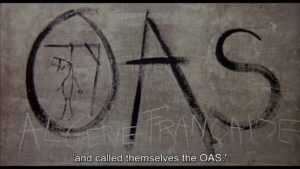
They carried out many attempts on de Gaulle’s life. The film starts with one such attempt where an ambush by the OAS in a Paris suburb leaves de Gaulle unhurt. The attempt was real and the conspirators were soon running for their lives. The conspirators are caught, and the French Secret Services relentlessly hunt the OAS members.
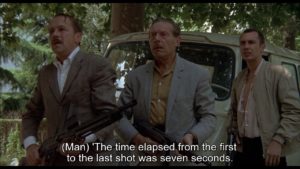
Fiction: The OAS heads decide that the only way to kill de Gaulle is to bring in an outsider who is not on French records.
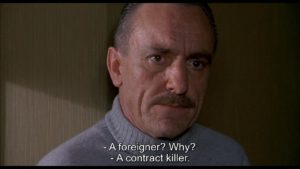
Enter the nameless Englishman who agrees to do the job and gives the code name Jackal and sets out planning the assassination meticulously. He leaves nothing to chance and creates three false identity cards.
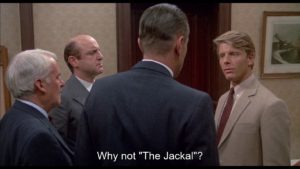
The French Intelligence knows that something is going on as the top three OAS officers are holed up in a hotel in Rome. They kidnap the courier who gets the daily mail for the trio and tortures him, and he reveals only the name, Jackal.
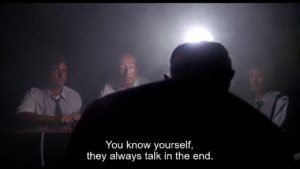
The manhunt is on.
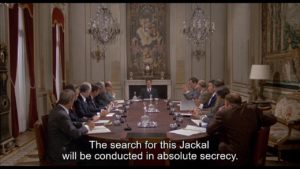
Claude Lebel, the French detective assigned to the job, soon gets going, asking various allied intelligence and police services for help. The British end comes through and the British are worried that a British citizen may be involved in an assassination plot to kill the French President. So they go all the way to ensure that nothing is left to chance and start producing the results.
The Jackal is always one step ahead thanks to his access to the ministerial group that is tracking him.
Fred Zinneman the director, has this penchant for stories that pit characters against impossible odds. His most famous example is High Noon (1952), where the town Sherriff (Gary Cooper) takes on vicious criminals against the wishes of the local population he had been protecting. From Here to Eternity has two such characters, Lee Prewitt (Montgomery Clift) and Sergeant Warden (Burt Lancaster), who go against the well-established Army rules and, in the case of Prewitt, disobey his superior because of his conscience. Yet another example is Behold a Pale Horse (1964), where ex republican Manuel (Gregory Peck) returns to his native Spain while being tracked by the Police in the form of Vinolas (Anthony Quinn).
All these films, have a central character who is mainly on the “right” of everything that is “right”. This time the story and the script completely subverts us to the Jackal’s point of view, and we want him to succeed. We know that de Gaulle died peacefully in 1972. So how can this story set in 1963 end, and subvert us to take Jackal’s side? Especially a man who speaks less, is obviously intelligent, smart, speaks multiple languages, is sophisticated, and most importantly, a committed professional. His nemesis Claude Lebel (Michael Lonsdale), is an equally committed professional. Both of them single-mindedly pursue their goals. While the Jackal has his anonymity, Lebel has his intelligence and the entire state apparatus behind him.
Many subtle moral questions are woven into the film’s thread, which is where the film is still relevant. No doubt the technology is “old” – rotary dial phones, typewriters, registration cards, card indexes etc. Still, these are all means to an end. These are all only tools and implements for the state to get its job done – much like the internet and computers and everything that goes with it. The film is probably one of the earliest to show how easy it was to get a new identity by presenting a birth certificate. No one bothered to check whether the birth certificate for one person had a death certificate. This technique was well used by Soviet “Illegals” to set themselves up in the West as genuine civilians.
It may all look boring on film, but the fact remains that most intelligence work is the careful assembling of facts that Claude Lebel manages continuously. He is as professional as the Jackal.
There is a shot where the Jackal knows that he has been “blown”, and he is in front of a signboard that points left – towards Paris – and right, towards the Italian border. He takes the left fork. This is where we suddenly marvel at his quiet confidence, composure, and professionalism.
In fact, in the film, everyone is a professional. The gunsmith is the best example. He asks whether the target will be stationary or moving, whether he will go for a headshot or a chest shot, and so on. They might as well be discussing the mechanics of good cooking.
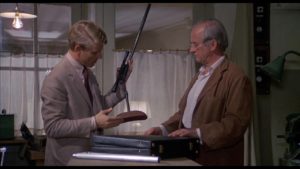
The Jackal then meticulously zeros the gun in a forest and finally uses the deadly mercury-tipped bullet to explode the target – a watermelon. We can only speculate with horror what would happen to a human head.
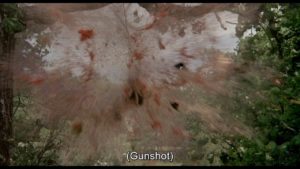
The film can be easily classified into various genres. Spy Film. Conspiracy Film. Assassination film – in fact, the 1993 Clint Eastwood thriller In the Line of fire is very much reminiscent of Day of the Jackal except that the assassin (John Malkovich) keeps on taunting the Secret Service.
The grand finale was shot at various locations during Liberation Day. It shows in multiple locations as the troops do their duty, oblivious of the cameras. Unprecedented access was given to the film crew to shoot at various real locations, which were then intercut with the studio sets.
Frederick Forsyth based the story on his experiences as a journalist across various situations. A story goes thus: Many publishers rejected the book as far-fetched. Finally, Hutchinson published it and it was a roaring success. One of the earlier publishers to whom he had taken it apparently fired its entire staff for ignoring the goldmine. That’s the story, but we probably need to take it with a pinch of salt.
All said and done, at the end of the day, it is riveting even today. Any story that is in keeping with the historical outcome has to be well plotted, and the film remains true to the book’s essence.
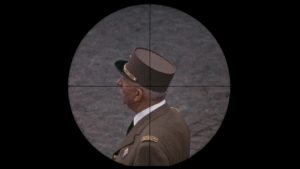
Avoid the 1997 “remake” The Jackal starring Bruce Willis in the title role. The premise? A Russian mobster wants to knock off the American President. And who can get the Jackal? an ex-IRA terrorist (Richard Gere’s “Irish accent” is a mirth quake)
For some strange reason, it’s not available on Amazon India but is there on Amazon US. It’s “Buy or Rent” under YouTube.
Real History/ Historical background – 4 out of 5
Script – 5 out of 5
Story – 4 out of 5
Direction – 5 out of 5
Overall Rating – 4.5 out of 5
Very nice!
Nice way to take us through the crux of the an all time favourite movie👍👏👌
Thanks. It is really subverting us to like the bad guy and we the audience want him to succed !
Seen the movie long ago. You comments has inspired me to see it again . Thank you Ramesh. One of the best scenes is when the minister asks him how did he find our one of the presidents aide was leaking information he answers I tapped all your phones .
Indeed. That’s terrific writing – scene is straight from the book.
I too tried watching the 2024 Jackal series but gave up after just 10 minutes.
Reading your review reminded me of the book and the brilliance of the original Day of the Jackal.